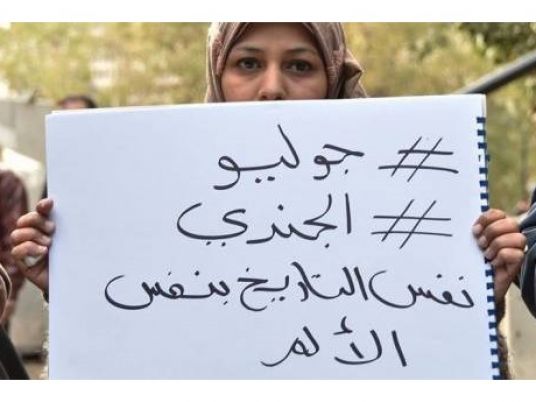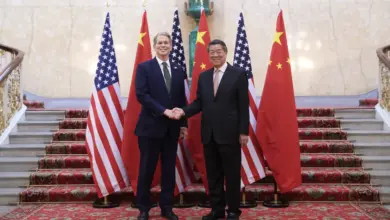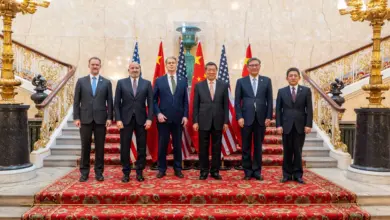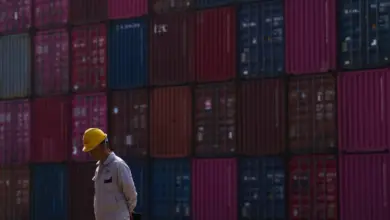
Egyptian President Abdel Fattah al-Sisi's tenure has so far witnessed the signing of huge investment deals with European countries including an unprecedented deal with the German company Siemens to build new electric plants and the first export deal of Rafale fighter jets in France's history.
The discovery of the Zohr natural gas field, named the biggest in the Mediterranean, off Egypt by Italian energy company Eni was also among the significant investments deals.
Trade relations with Europe, Egypt's leading trade partner, have continued unabated, with Egypt vowing to lift hefty import tariffs off imported European cars, in line with the Association Agreement signed between the two sides in 2001, even though this could harm the Egyptian automobile industry.
Meanwhile, Amnesty International and the European Parliament among others have criticized the rising restrictions on freedoms and the rampant violations in Egypt amid a tense political environment.
Most recently, the murder of 28-year-old Italian researcher Giulio Regeni, whose body was found bearing signs of torture in a ditch on the outskirts of Cairo, has put the spotlight on Egypt's human rights record with rights defenders in Europe demanding more economic pressure on Egypt.
Amnesty urged the Italian government-backed company Eni in a letter addressed to its chief executive to reveal the identity of Regeni’s murderers, who are suspected to be from the Egyptian security apparatuses.
Regeni went missing in Cairo on January 25, 2015, which marked the fifth anniversary of the popular uprising that toppled former president Hosni Mubarak, and was found ten days later.
In this regard, Aswat Masriya spoke to a group of experts on EU political and economic relations and on which of these has a higher impact during the upcoming period.
Here is what they had to say:
Stephan Roll, Ph.D. — Research Associate at the German Institute for International and Security Afairs
There is a clear Western “double strategy” in dealing with Egypt
On the one hand, Western policymakers criticize Egypt in international bodies like the UN Human Rights Council or the European Parliament. On the other hand, Western countries are open for economic cooperation and business.
Human rights issues and economic cooperation are completely disconnected. The “official” logic behind this is that Egypt is too big to fail and therefore there is no alternative for economic cooperation.
The most important driver for this policy is the fear in Europe of more refugees. However, another reason, which is at least as relevant, is that there is a lot of pressure from Western companies on their respective governments to enhance the relations with the Sisi-regime for getting contracts (Eni in Italy, Siemens in Germany, Dassault Aviation in France and British Gas and British Petroleum in Britain).
The ongoing deals will help to strengthen the disconnection between business politics and human rights criticism. France, Italy, Germany, Great Britain are among the European countries currently benefiting from deals with Sisi's Egypt.
Italy might become a special case — here, criticism became much more emotional because of the Guilo Regeni case. However, I think that even in the case of Italy we will see “normalisation” of the relationship — not only because of Eni's interests, but also because of increasing numbers of refugees coming from Egypt. I think that Sisi's administration is very smart in playing that card to increase pressure on Italy.
Martyn Egan, Ph.D. — sociologist at the European University Institute
Regeni murder not favourable to Sisi
Arguably, the main reason for European reticence [regarding Egypt's human rights record] is that the rest of the MENA region is so fragile at the moment that the EU places a premium on Egyptian “stability” — particularly in light of the refugee crisis, which has resulted in a similarly muted response to the deteriorating human rights situation in Turkey.
The EU is often criticised as a weak actor in normative terms. Certainly, with respect to the U.S., it is much slower to respond. I think the Regeni's murder has finally begun to start focusing minds though, and not in a way which is favourable to Sisi.
There is definitely a breaking point for the EU, where domestic criticism eventually overrides economic interest.
In the case of the Arab Gulf, this is obviously quite a high breaking point, as the economic benefits are so large (billions of euros for weapons systems, transport systems, energy, etc.). In the case of Egypt I suspect the breaking point will be much lower though, as the economic benefits (with the exception of Italy) are less pronounced.
I believe what we are seeing in the Regeni case reflects this: the Egyptian authorities have been careful to give the appearance of engagement (even if this has at times been utterly farcical), because they know that refusing to cooperate will quickly breach the threshold of tolerance within European public opinion.
Certainly, in the case of Italy there has been a very palpable sense that the Eni deal is hanging over the government’s handling of the Regeni murder. We shouldn’t over-exaggerate though; if the Egyptian government fails to provide a satisfactory answer, it won’t matter how many gas fields there are in the balance.
We are already witnessing a steady hardening of the Italian and European response, and I think the Egyptian regime is capable of sensing this. Whether it is capable of acting on it is another question.
Italy is among the European countries that are benefiting most from deals with Egypt. But, once repression reaches beyond a certain level, it becomes very difficult for EU member states to continue engaging. Ultimately, EU governments have to answer to their electorates, and while human rights rarely swing elections definitively one way or the other, moral authority quickly drains away from governments which fail to heed public opinion. And without moral authority, it is a lot harder to win elections.
Kevin Koehler, Ph.D. — Assistant Professor of Political Science at the American University in Cairo
Security profitable deals matters more to Europe than human rights
Human rights concerns are not central to the foreign policy agendas of most European countries. This is particularly true for the large economies such as Germany and France, for example. Securing lucrative deals for their firms and access to Egyptian markets is more important for them.
A clear indication of this is the recent visit of French president Francois Hollande and German vice-chancellor and economy minister Sigmar Gabriel to Cairo. Gabriel explicitly came in the context of an Egyptian-German meeting of economic stakeholders and his statement about how he was impressed by al-Sisi speaks clearly as well.
Human rights activists have only a very limited impact on this level of politics. Their impact in parliaments –both in individual member states and the European parliament — is much greater. However, this is unlikely to shape the foreign policies of European states.
The case of Giulio Regeni is beginning to change this picture. A sustained campaign by human rights activists in Italy has meant that the Italian government had little choice but to consistently exert pressure on Egypt. The withdrawal of the Italian ambassador from Egypt is a first step in this direction. The Italian government also tries to influence the stance of other European governments towards Egypt — so far with limited success however.
Nevertheless, there are concerns in some European policy circles about whether the current leadership in Egypt can indeed delivered the type of stability it is promising. These concerns have not yet shaped policy, but if the situation further deteriorates they might.
Most European governments have followed a cautious strategy that tries to combine support for Egyptian development with opportunities for European companies. This was the default position before the Arab Spring and it has remained that way. If anything, the preference for stability has become stronger in the context of the current refugee crisis in Europe.
The top European economic partners of Egypt are Germany and Italy with an annual trade volume of about 5 billion euros, followed by France with 2.9 billion euros. European governments will take the Regeni case and general instability in Egypt as a warning sign and will certainly take these issues into account when giving advice to investors in their countries.
In principle, European governments could restrict cooperation with Egypt. However, I think that this is not very likely to happen because of human rights violations. Sisi is consciously using this discourse [of stability] when he warns of an even larger influx of refugees into Europe should Egypt be destabilised. European states will only change their positions if it becomes clear that Sisi is not delivering the type of stability European government are hoping for. Some European analysts are convinced that this is the case already.
Samer Atallah, Ph.D. — Assistant Professor of Economics and Political Economy at the American University in Cairo
Egypt's regime has become a burden on Europe
Most of the investment deals signed were negotiated before criticism escalated from Western rights organisations.
I think that policymakers turned a blind eye to this criticism due to the significance of the deals, both economically and politically. This is also because relations with Egypt have relied on an internal rhetoric that is premised on the idea that Egypt "is fighting terrorism."
But the important question is what will the European response be after criticism has escalated lately, going beyond the realm of rights groups and affecting public opinion, as in Italy?
In my opinion, the political regime in Egypt has increasingly become a burden on the West. Even if economic interests are more important, the cost of cooperation with the Egyptian authorities is mounting.
However, the European stance towards Egypt remains as dealing with the current regime bearing in mind the absence of other alternatives amid a tense regional environment.




